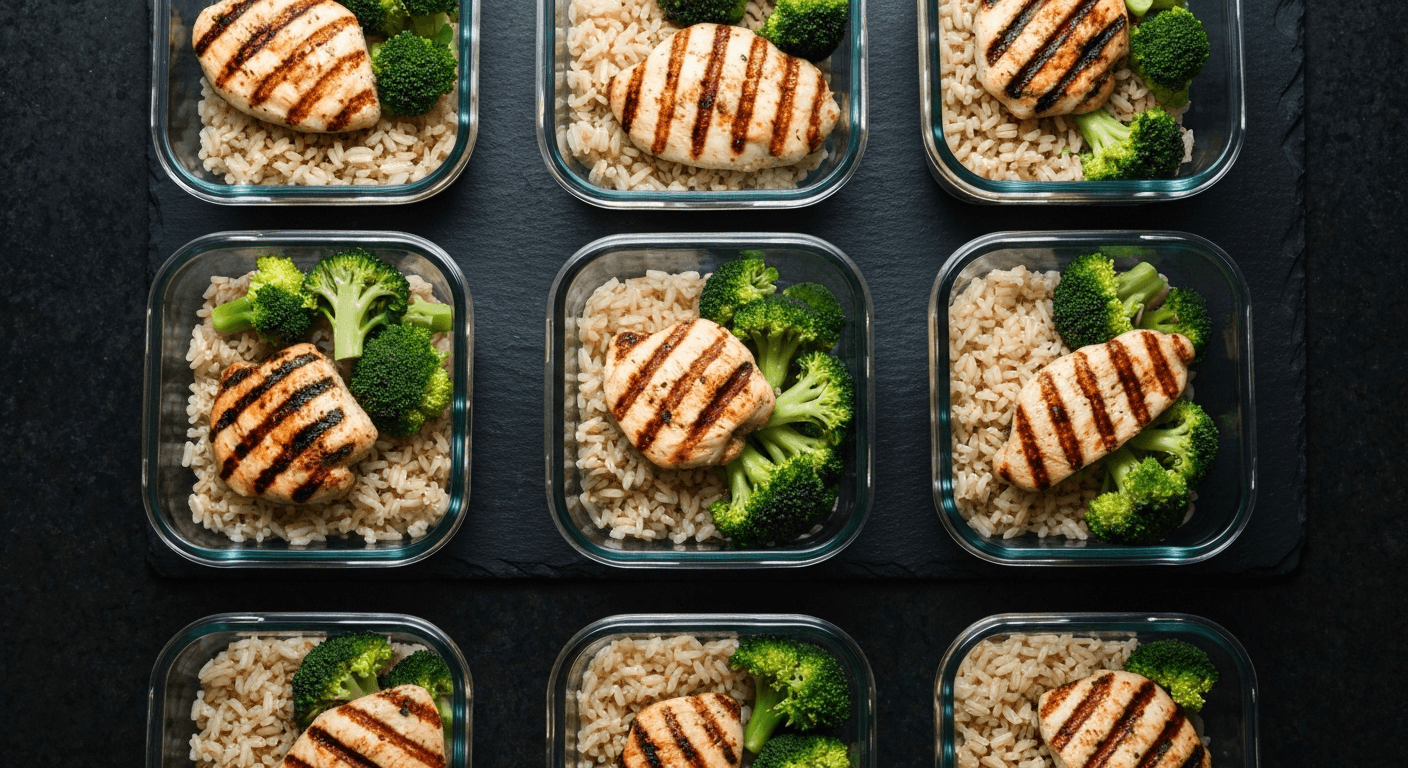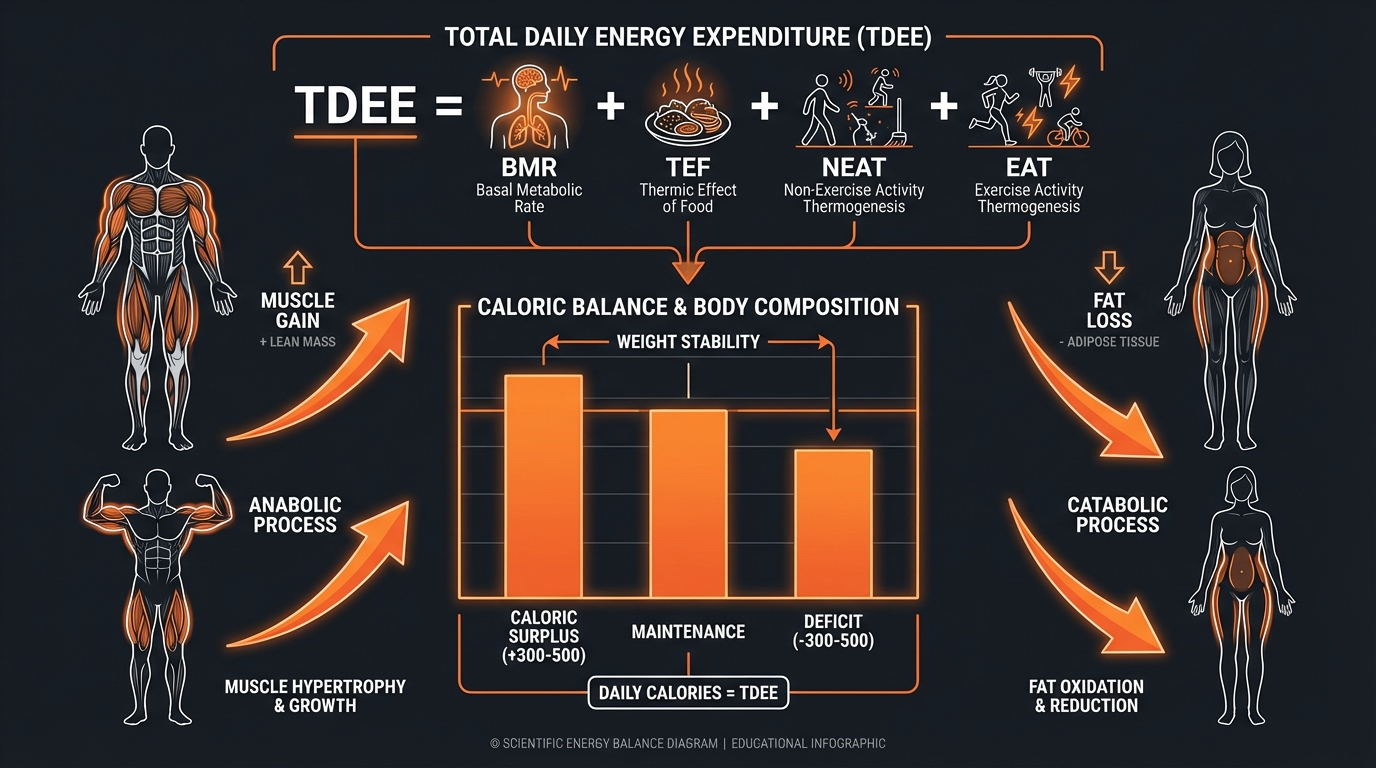7-Day Meal Plan for Lean Bulking: 3000 Calorie Diet
Read our comprehensive guide on 7-day meal plan for lean bulking: 3000 calorie diet.

Key Takeaways
- A 3000 calorie diet gives you a 10-20% surplus above maintenance which is perfect for building muscle without getting fat.
- You want to hit 1.6-2.2g protein per kg bodyweight, 3-5g carbs per kg, and 0.5-1.5g fat per kg for optimal gains.
- The meal plan rotates focus between high protein days, carb loading days, and healthy fat days to keep your body guessing.
- Track your weight and body composition weekly to make sure you're gaining muscle not just getting fluffy.
- Sleep 7-9 hours and stay hydrated because recovery is when the actual muscle growth happens.
Get a Free AI Coach on WhatsApp
Ask questions, get workout plans, and track your progress — all from WhatsApp.
Message Your CoachGaining muscle while minimising fat gain can be challenging, but a well-planned diet can make all the difference. Here, we present a comprehensive 7-day meal plan for lean bulking on a 3000 calorie diet to help you achieve your fitness goals effectively. This plan focuses on nutrient-dense foods that provide the right balance of protein, carbohydrates, and healthy fats to support muscle growth and recovery.
Why Choose a 3000 Calorie Diet for Lean Bulking?
A 3000 calorie diet is commonly recommended for individuals aiming to gain lean muscle mass. Consuming an adequate amount of calories, especially from a balanced mix of macronutrients, is essential for muscle hypertrophy and strength gains. This calorie level allows for a moderate calorie surplus, which is ideal for gradual muscle gain while minimising fat accumulation (source).
Research suggests that a calorie surplus of around 10-20% above maintenance levels is optimal for lean bulking. For most people, this translates to an additional 300-500 calories per day. A 3000 calorie diet strikes a perfect balance, providing enough energy to support muscle growth without excessive fat gain (source).

Macronutrient Breakdown for Lean Bulking
When planning a lean bulking diet, it's crucial to get the right balance of macronutrients - protein, carbohydrates, and fat. Here's a general guideline for a 3000 calorie diet:
- •Protein: 1.6-2.2 grams per kilogram of body weight (25-30% of total calories)
- •Carbohydrates: 3-5 grams per kilogram of body weight (40-50% of total calories)
- •Fat: 0.5-1.5 grams per kilogram of body weight (20-30% of total calories)
Protein is vital for muscle repair and growth, while carbohydrates provide energy for intense workouts. Healthy fats support hormone production and overall health. Adjusting these ratios based on individual needs and preferences can help optimise results (source).
7-Day Meal Plan
Day 1: High-Protein Kickstart
- •Breakfast: 4 scrambled eggs, 2 slices of whole-wheat toast with avocado, and a glass of orange juice
- •Snack: Greek yogurt with honey and mixed berries
- •Lunch: Grilled chicken breast, quinoa, and steamed broccoli
- •Snack: Protein shake with a banana
- •Dinner: Baked salmon, sweet potatoes, and asparagus
Day 2: Carb-Focused Energy Boost
- •Breakfast: Oatmeal with almond butter, sliced bananas, and a scoop of protein powder
- •Snack: Handful of mixed nuts and an apple
- •Lunch: Turkey and avocado wrap with a whole-grain tortilla and mixed greens
- •Snack: Cottage cheese with pineapple chunks
- •Dinner: Beef stir-fry with brown rice and mixed vegetables
Day 3: Healthy Fats for Hormone Support
- •Breakfast: Smoothie with spinach, protein powder, mixed berries, and almond milk
- •Snack: Whole-grain crackers with hummus
- •Lunch: Tuna salad with olive oil dressing, served over a bed of leafy greens
- •Snack: Protein bar and a pear
- •Dinner: Baked chicken thighs, quinoa, and roasted Brussels sprouts
Day 4: Plant-Based Protein Power
- •Breakfast: Tofu scramble with mixed vegetables and whole-grain toast
- •Snack: Edamame and a small serving of trail mix
- •Lunch: Lentil soup with a side of whole-grain bread
- •Snack: Soy protein shake and a peach
- •Dinner: Tempeh stir-fry with quinoa and steamed broccoli
Day 5: Lean Red Meat and Complex Carbs
- •Breakfast: Whole-grain bagel with almond butter and sliced bananas
- •Snack: Hard-boiled eggs and carrot sticks
- •Lunch: Lean ground beef chili with kidney beans and brown rice
- •Snack: Greek yogurt with granola and berries
- •Dinner: Grilled sirloin steak, baked sweet potato, and asparagus
Day 6: Omega-3 Fatty Acids for Inflammation Control
- •Breakfast: Smoked salmon, avocado, and spinach omelet
- •Snack: Chia seed pudding with almond milk and mixed berries
- •Lunch: Grilled shrimp skewers, quinoa, and roasted vegetables
- •Snack: Sardines on whole-grain crackers
- •Dinner: Baked cod, brown rice, and steamed broccoli
Day 7: Balanced Macronutrients for Recovery
- •Breakfast: Protein pancakes with Greek yogurt and sliced fruit
- •Snack: Protein shake and a banana
- •Lunch: Grilled chicken salad with mixed greens, avocado, and olive oil dressing
- •Snack: Rice cakes with almond butter and sliced apples
- •Dinner: Turkey meatballs, whole-wheat pasta, and marinara sauce with a side salad
Tips for Success on a Lean Bulking Diet
- •Consistency is key: Stick to your meal plan as closely as possible to ensure you're getting the right balance of nutrients and calories (source).
- •Track your progress: Monitor your weight, body composition, and strength gains regularly to assess your progress and make adjustments as needed (source).
- •Stay hydrated: Drink plenty of water throughout the day to support muscle function and overall health.
- •Get enough sleep: Aim for 7-9 hours of quality sleep per night to promote muscle recovery and hormone regulation.
- •Supplement wisely: Consider adding supplements like creatine, protein powder, and omega-3 fatty acids to support your lean bulking goals.
Conclusion
A well-planned 3000 calorie diet can be highly effective for lean bulking, providing the necessary nutrients and energy to support muscle growth and recovery. By focusing on whole, nutrient-dense foods and maintaining a balanced macronutrient ratio, you can maximise your gains while minimising fat accumulation.
Remember, everyone's nutritional needs and responses are different, so it's essential to listen to your body and adjust your diet as needed. With consistency, dedication, and a solid meal plan, you'll be well on your way to achieving your lean bulking goals.
Frequently Asked Questions
- Is 3000 calories enough to bulk?
- For most guys between 140-180 pounds, 3000 calories is a solid lean bulk target. If you're heavier or very active, you might need more. Track your weight weekly and if you're not gaining 0.5 pounds per week, add 200 more calories.
- What does a 3000 calorie bulking day look like?
- Roughly: 4-5 meals with 40-50g protein each, plus snacks. A typical day might be eggs and oats for breakfast, chicken and rice for lunch, a protein shake and banana as a snack, steak with potatoes for dinner, and Greek yogurt with peanut butter before bed.
- How much protein should a 3000 calorie bulk have?
- Aim for 180-220g of protein, which is about 25-30% of your total calories. Split that across 4-5 meals for better absorption. The rest should be roughly 350-400g carbs and 80-90g fat.
- Can I meal prep a 3000 calorie bulking diet?
- Absolutely, and you probably should. Cook 5 pounds of chicken breast, a big batch of rice, and roast a bunch of vegetables on Sunday. Having food ready to grab makes hitting 3000 calories consistently way easier than cooking every meal fresh.